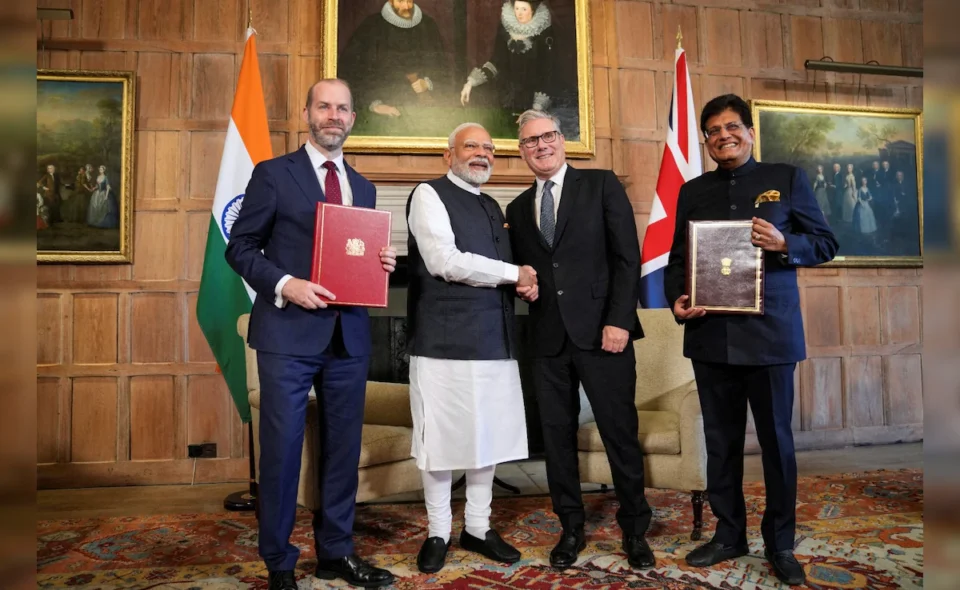In a significant step toward deepening bilateral economic cooperation, India and the United Kingdom have signed a historic Free Trade Agreement (FTA) aimed at doubling trade between the two nations by the year 2030.
The pact, officially titled the Comprehensive Economic and Trade Agreement (CETA), was signed by India’s Commerce Minister Piyush Goyal and UK Trade Secretary Jonathan Reynolds in the presence of Prime Minister Narendra Modi and UK Prime Minister Sir Keir Starmer. The ceremonial signing took place at the UK Prime Minister’s official countryside residence, Chequers, marking a pivotal moment in post-Brexit UK trade relations and India’s global market expansion strategy.
Major Win for Indian Farmers
Addressing the media after the signing, PM Modi described the agreement as a milestone in India-UK relations, emphasizing that Indian farmers stand to benefit the most. The deal provides duty-free access to Indian agricultural and processed food products in British markets — a move set to boost rural incomes and market reach.
Products such as turmeric, cardamom, pepper, mango pulp, pickles, and various pulses are now eligible for tariff-free export to the UK. “This agreement opens new doors for India’s agricultural and food processing industries,” Modi said, adding that it will offer better trade terms compared to existing European exporters.
Expanding India’s Export Landscape
Beyond agriculture, the agreement also offers enhanced market access for key Indian sectors, including textiles, gems and jewellery, footwear, seafood, and engineering goods. The pact aims to significantly improve India’s export competitiveness in the UK and help drive domestic manufacturing and job creation.
“CETA will help take bilateral trade from the current $60 billion to over $120 billion by 2030,” PM Modi added, expressing gratitude to Prime Minister Starmer for his support and hospitality.
Addressing Concerns and Strengthening Partnerships
While some UK stakeholders had raised concerns over the agreement’s labour mobility provisions, particularly around the temporary secondment of Indian workers, UK Business Secretary Jonathan Reynolds clarified that the pact offers no preferential terms beyond existing standards already extended to other countries. He dismissed concerns of potential harm to British workers as “completely unfounded.”
UK PM Keir Starmer hailed the trade pact as “the most substantial and economically impactful agreement the UK has signed since Brexit.” He emphasized that the deal reflects a new era of collaboration between two dynamic democracies, focused on inclusive growth, sustainability, and innovation.
Trade Expected to Double by 2030
The CETA aims to expand bilateral trade from the current $60 billion to $120 billion over the next five years. Experts believe that the agreement could serve as a model for future trade deals between developing and developed economies, especially in the context of inclusive growth and market access.
Both governments have also committed to working closely on innovation, technology transfer, digital trade, and sustainable development as part of the broader strategic framework under the deal.
Looking Forward
This agreement follows years of negotiation and symbolizes a shared commitment to strengthening trade, investment, and strategic cooperation. With mutual benefits across multiple sectors and a strong emphasis on equitable trade practices, CETA is set to transform India-UK economic relations for the coming decade.

